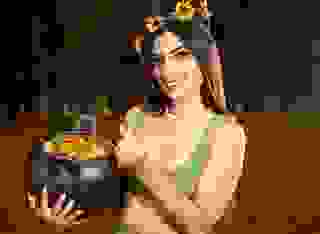Note: You can change font size, font face, and turn on dark mode by clicking the "A" icon tab in the Story Info Box.
You can temporarily switch back to a Classic Literotica® experience during our ongoing public Beta testing. Please consider leaving feedback on issues you experience or suggest improvements.
Click hereUrbo was a minor legend in Whydah. He was the only sea captain known to have the Talent. Some folk claimed that he could harness the power of the winds, or soothe the angry waters (though it was difficult to believe that Tomuun would allow a mere mortal to usurp her prerogative).
Just as I was examining him, Urbo looked up - directly at me. He grinned.
- "Lord Tauma, I presume?" he called out.
- "You know me?"
- "Your arrival was hardly inconspicuous, Lord. If you wanted to remain incognito, you should have brought along a less imposing bodyguard."
Durgat, who was standing behind me, merely grunted.
"You're welcome to come aboard, if you wish." said Urbo.
I glanced at Hurmas and Sezima, to see if they approved. Of course they did; we might not have many tales to tell, by the end of our travels, or we might have hundreds - but meeting Captain Urbo, and being invited onto his ship, would certainly be one of them.
We went aboard his ship, called First Light, and I introduced my companions. Urbo, it seemed, already knew who they were as well. He was much taken with Durgat, though.
- "This is your Grand Tour, is it?" Urbo asked me. "Your year of travel?"
- "How do you know that?"
He responded with a toothy grin. "I met your elder brother a few years ago. I was the one who took him to Portoa, and to Galtin's Port. I was virtually unknown at the time, so Lord Aludar was granting me a great favour. Sadly, your brother Lord Nathal made arrangements to sail on another vessel than mine. But I would be honoured to provide that service for you and your friends."
- "Thank you, Captain." I said. "But we won't be making that voyage for quite some time. It will be many months before we return to Whydah."
- "Exactly. But if you were to give me an approximate date, I could arrange my business so as to be available when you need me."
It was an intriguing proposal. Urbo was being just a little bit forward - presumptuous, even - but I found that I didn't mind. I supposed that ship captains couldn't afford to be shy, or reserved.
"We were just about to have our midday meal." said Urbo. "Why don't you and your friends join us? That will give you an opportunity to get to know us. Then you can decide if you want to travel with us, when the time comes."
Urbo must have been after patronage - a strong connection with the Duke's sons. I doubted that a few passengers' fares would be enough money to tempt him to change his ship's schedule. He was open and above-board with it, though; I couldn't fault him for trying.
We accepted the offer, and shared in the crew's feast of fried smelts, with plenty of fresh bread and butter. When on shore, the sailors delighted in eating fresh food; out at sea, and especially in bad weather, they frequently subsisted on cold salt pork and thrice-baked bread, which some called 'biscuit'.
- "Unappetizing?" I asked.
- "It's not so bad. But after a few days, it gets awfully monotonous. Gets so that you start longing for journey's end."
Urbo was an excellent host. He took his cues from our questions, and told colourful stories to illustrate his points. His crew were surprisingly attentive; either they hadn't heard some of these tales, or they simply hadn't heard them often enough to be tired of them.
We spent a pleasant hour aboard Urbo's ship. Hurmas and Sezima were all for it, so I promised to send word regarding our travel plans. Before we parted, though, it was the Captain who had a question for me.
Hurmas and Sezima were already headed down the gangplank. I shook hands with our host, and thanked him once more for inviting us to share their meal.
- "You surprise me, Lord Tauma." he said.
- "How so?"
- "You asked me about the name of my ship. You asked my crew where they came from, and about their homes. You even enquired about how much I would charge you for passage to Portoa. Yet you never raised the one subject that virtually everyone does."
- "About your magic?"
- "Weren't you the least bit curious?"
- "I thought that you might be tired of answering that question." I said. "I would be, in your place. Besides, if we do travel with you, there will be plenty of time for that."
Urbo gave me a good, long look. "Thoughtful. And patient. That's a good combination, young Lord. I hope that you'll come aboard First Light again."
***
With my uncle's help, we procured a score of good horses, for riding and for carrying our baggage - not that there was too much of that. A few tents, just in case we were caught in the open, extra provisions, and a few small gifts for those people who would shelter us on our journey.
I also bought ink, paper, and quills.
- "Who is she?" asked Sezima.
- "Pardon?"
- "Every night - and several times a day - you get a faraway expression on your face. Hurmas and I have to repeat ourselves, because it's obvious that you haven't heard a word we were saying. And now you go out and buy ink and paper? You bought every scrap that fellow had."
- "I'll be writing letters... to my family."
Sezima snorted. "We all know about your father, and I can't even begin to imagine you writing to your mother."
- "Even Aludar can't be expecting you to write that much." said Hurmas.
- "So..." said Sezima, with one eyebrow raised. "Who is she?"
- "It's complicated." I said.
Sezima was unfazed. "Hurmas believes that it's the young woman you defended in that affair with the scholar. But I think it's an older woman. Is she married? Is that it? Tell me that's it."
We were going to be travelling together for a year or more. I didn't know if I could write letters in private, or keep a secret that long. Hurmas and Sezima both seemed to be honourable men.
- "Her name is Glasha." I said. "She's been my friend since childhood."
Hurmas smiled, but Sezima shook his head. "Really? You've just cost me money, Tauma. A fairly small sum - I'll admit that much - but still, one that I'm reluctant to part with."
- "I'm sorry."
- "No, I don't think that you are." He sniffed. "But I'll give you many opportunities to make it up to me. For example, if - during the course of our travels - if any young women should make inappropriate advances towards you, you can simply send them my way. Or attractive older women. Consider it my gift to you and your friend Glahsa."
- "Glasha." corrected Hurmas.
- "Yes. Glasha. You knew her name all along, didn't you, you cheat? No matter. I will sacrifice my virtue - repeatedly, if necessary - to protect you, Tauma. Just send me all of the women you're not interested in."
I had to smile at that. "Consider it done."
***
We rode east from Whydah, across the coastal plain. The farms here were prosperous, but not extremely rich. The coastline was rugged, and utterly devoid of any location which might have made a decent harbour.
We visited the homes of two Gerdar, but I got the impression at both stops that we were not especially welcome. The hospitality was grudging, for lack of a better word. I understand that feeding the Duke's son, his two friends, his hulking bodyguard, and eight more retainers can be expensive - never mind the cost of feeding twenty horses.
But this was not a regular occurrence. My father rarely travelled these parts. Nor did we stay longer than a night or two. The burden was short-lived. I made a note of these places. My father might not care, but Aludar would. I thought of the conservatives again; surely hospitality and generosity were among the virtues they claimed to revere.
The village of Calep - well on the way to becoming a small town - was a pleasant change. The people were unpretentious, gregarious, and genuinely curious about us. Sezima made a point of 'protecting' me from a friendly and somewhat inquisitive young woman.
- "I hope you realize - I'm only putting myself in harm's way like this for your sake." he said.
Hurmas rolled his eyes. "What a noble sacrifice."
- "Exactly." said Sezima. "Don't wait up for me."
The Gerdar of Calep was an extremely homely fellow named Dergun, who impressed me at our very first meeting. He welcomed the three of us, and then greeted my bodyguard - in orcish.
- "Aka'Magosh." said Dergun.
It was one of perhaps three dozen phrases of orcish that I'd learned. 'A blessing on you and yours', he'd said.
- "You speak Orcish?" I asked him.
- "A little." he said. "Sometimes, though, a little goes a long way."
I was curious - especially since the territory of the Red Knee orcs was the next stop on our itinerary. "How do you get along with them?" I asked Dergun.
- "Very well, for the most part. We haven't had a serious incident in my lifetime - and I'm 35 years old."
- "Really?"
- "They're very scrupulous about sticking to the terms of the Duke's treaty. The only trouble comes from hotheads on our side. Every so often, I have to go and evict squatters who've set up on Red Knee land. And then there are the idiots who try to stir things up, claiming that the orcs are encroaching on our lands, raping our women, or some other nonsense."
- "I know the type." I said.
Dergun was a pleasant surprise. He was generous to a fault, open-minded, and easy to talk to. He was the first noblemen I'd met since leaving Elmina that I genuinely liked (and that included my own relatives in Whydah).
He pressed us to stay another night; I promised that we would return after we'd visited the Red Knees.
Between Dergun's descriptions and my own experiences with Yazgash and Durgat, I had no worries about entering the territory of the half-orcs. Some of them might look fearsome, but they had an easily understood code of honour. It was a simple matter of showing them respect. Too many humans demand respect, without having done anything to earn it. Give respect to get respect - it's not that difficult.
I greeted the first scouts we met in their own language (always a good start, as Dergun had advised). We were escorted to the very centre of their community: the Blasted Tree. It was an enormous dead tree, struck by lightning centuries earlier, and somehow petrified so that it remained standing. It was a powerful symbol to the Red Knees. Some even considered it the source of their good luck.
The founder of our dynasty, Arivan Cunedda, had signed a treaty with these half-orcs: he'd recognized their claim to the lands they inhabited, and offered them his protection, in return for the service of a number of their young warriors.
Both sides had profited from the bargain. The Duke gained a contingent of truly intimidating warriors. In my opinion, though, Varna got much more than that: we learned that we could co-exist with a non-human race. Curiosity won out over fear.
There were far more orcs - half-orcs, to be precise - than I'd expected. Peace and the Duke's protection had been good for the Red Knees too it seemed. They had prospered - and multiplied.
Their Chieftain was Hanurak LongArm. He and I had to overcome a not-so-slight misconception quite early in our relationship.
Hanurak, you see, had won his position the old-fashioned way: by killing his predecessor in single combat. Given that, he could be forgiven for keeping one eye open at all times. He was always on the lookout for the next challenger.
The moment he saw my hulking bodyguard, Hanurak concluded that I'd brought Durgat here to take the chieftaincy from him. After a few moments of confusion, I could easily understand his fears. Hanurak had the reach, and the experience, but Durgat was... impressive.
Fortunately, we were able to convince the chieftain that Durgat had no ambitions to replace him. Durgat was far more interested in meeting as many half-orc females as he could - and not so that he could plot Hanurak's overthrow.
With that misunderstanding out of the way, we enjoyed our stay with the half-orcs. They fed us well, and were proud to show us anything we wanted to see. I was impressed by the egalitarian nature of their society: the blacksmith was female, as was the shaman. I was told that a number of their past chieftains had been female, as well.
It made me think of my own family. Sanatha was probably the best of us all, but she would never be allowed to rule. She was as bright as Aludar, and much kinder than me.
We all enjoyed our stay. Hurmas and I had much to think about, and to discuss. Sezima once more stepped in to 'protect' me, and entered into a torrid relationship with a female half-orc warrior. This time, he had the bruises and scars to prove that he had risked life and limb in order to keep me out of danger.
Durgat, meanwhile, cut a swath through the female population of the Blasted Tree. He had two short brawls with other males, from which he emerged victorious (and largely unhurt). Unless I was sadly mistaken, there would be a few little Durgats born in nine months time.
***
After a return visit to Dergun in Calep, we set out south-west. We couldn't go everywhere in Eastern Varna, but we tried to see as many significant settlements as possible.
Sometimes, we were welcomed. Tir Pyera used our arrival as the excuse to celebrate with a feast. He'd been much taken with my brother Nathal. I don't know if he expected me to resemble my brother, or if he was kind to us in order to please Nathal.
Tir Moksha, by contrast, was almost hostile. His lands were one of the few places that my brother Merik had visited during his abbreviated tour of Varna. I couldn't entirely blame Moksha: Merik had deflowered the Tir's niece and left two of his serving maids pregnant.
We didn't stay long.
- "I should have addressed the issue." I said, to Hurmas.
- "To what end?"
It was a good question. What could I have offered Tir Moksha, in terms of restitution? My father must have heard the tales - salacious gossip travels fast - yet he chose to do nothing. If he had acknowledged the allegations, he would have been compelled to punish Merik. But would that have been so bad?
Hurmas, Sezima and I had several conversations about justice, and its selective application. We were young, idealistic, and naive. Sezima's cynicism was mostly an act, a self-defence mechanism. We solved nothing - except that we became closer friends.
We could have made a short detour in order to stop over in Elmina.
I didn't want to see my father - I wouldn't have been able to resist asking why he hadn't punished Merik. It would have been nice to see Aludar (if he was there) and Sanatha.
The real reason I didn't was Glasha.
I'd used up most of the paper purchased in Whydah, writing letters to her. I described what I was seeing, what we were experiencing... and how often I thought of her, which was every day - several times a day.
Whenever we could find someone who would be travelling to Elmina, I took the opportunity to send a packet of my letters with them: a brief note to my father, letters for Aludar & Sanatha, and a shorter one for Toran - and page after page of my ramblings for Glasha.
But I still had no answers to the questions I'd been asking myself. Most important, though, I was afraid that if I returned to Elmina, I would never be able to leave again. That was why we steered well clear of the capital as we wound our way south.
We came within sight of the Amber Hills, the source of so much of Portoa's wealth. We crossed the headwaters of the River Varna, and turned north.
At first, we passed through the estates of the greatest of the Tir, Tir Peneda, known far and wide as Peneda of the Hundred Horse, for the size of his armed and mounted retinue. He was by far the most powerful nobleman in the south, as dominant a figure as the Esins were in the north.
He was a distinguished-looking older man, whose hair and beard were transitioning from grey to white. But his eyes were still keen, and the mind behind them sharp. He hosted our entire party, and fed us well, but Tir Peneda seemed to expect to be repaid with detailed answers to his questions. He wanted to know everything we could possibly tell him: the quantity of traffic and trade on the river, the harvest in the east, the number of ships in harbour at Whydah, marriages and betrothals between the Gerdar and the Tir that we'd encountered on our travels...
He was a man of my father's generation, and apparently cut from the same cloth. Neither my companions nor I wanted to overstay our welcome.
- "I would hate to have him for an enemy." said Hurmas.
- "I felt like we were on trial." said Sezima. His family's holdings were in the south, as well. They could not afford to antagonize Tir Peneda any more than they could my father.
A few days later, we stayed with Sezima's family. They were delighted to have him home again, even though they knew that our stay would be brief. We had not yet reached the halfway point of our journey.
Sezima's folk were hospitable, generous, and good-humoured. Hurmas and I roared with laughter when we saw that they responded to many of Sezima's comments just as we did: with a roll of the eyes, or a shake of the head.
- "Good people, your family." said Hurmas.
- "I didn't have a choice." said Sezima. "You can you pick your friends, and you can pick your nose, but you can't pick your friend's nose."
Hurmas and I rolled our eyes - again.
"Actually, the saying is: you can pick your friends, and you can pick your nose, but you can't pick your family." said Sezima.
- "I agree with Hurmas." I said. "You are very fortunate in your family."
- "I am." said Sezima. "Just don't tell anybody."
***
The south differed from the rest of Varna, in the sense that the forests were sparser, and there was more open land. It wasn't all suitable for agriculture, of course, but there were large areas available for grazing cattle and sheep.
As we moved north, into the region more properly known as the West, the woods became denser, and human settlements more scattered. There were garden plots, rather than large farms. The farmers kept pigs, which rooted around under the trees for acorns. And just a little further off, to the west, loomed the impenetrable forests, home to the elves, the wild boar, and the fey.
We stayed two nights with Gerdar Tanle. It was an eye-opening and instructive experience.
First of all, Gerdar Tanle was a woman. There were precedents in Varnan history, but my father's conservative cronies would have preferred a male Gerdar.
Tanle was in her forties. She'd once been a striking woman, and she still was - but for very different reasons. Her father had sired only daughters, but had come to the conclusion that his eldest had the intelligence and strength of character to succeed him. One of Tanle's male cousins had disagreed, and registered his disapproval by trying to kill her.
The dagger intended for her throat had missed; instead, Tanle lost a chunk of her left cheek as well as the eye above it. She somehow succeeded in fending off her attacker. Months later, she was able to track him down and defeat him, along with his followers.
Tanle was an imposing character, much like Peneda, only more distant. She didn't fully trust other humans (who could blame her?) - which was another reason that the conservatives would not give her her due.
She was easily more powerful than half of the Tirs, but my father would not grant her the title. She was female, and she was on friendly terms with the non-human races of the West. She had lived openly with an elven lover for over a decade; her three children were the fruit of this union.
For these sins, she could not be recognized for what she was: one of the more important nobles in the West.
If she had a grievance against my father, she never showed it; she barely spoke to the three of us, but we could find no fault with the food or accommodations provided for us. She'd even arranged entertainment, with an elven storyteller, and a mixed group of musicians: human, elven, and fey. I myself recognized two of them, because they'd played at Elmina when I was much younger.








